Linta Khan, a WISE graduate of East Lyme High School, came to America from Peshawar, Pakistan, when she was only 4 years old. A year later 9/11 happened, and she grew up believing that her “faith and the country [she] lived in were two different things.”
After years of struggling with her identity, Linta decided it was time to learn the truth about her Muslim faith and share that knowledge with others.
For her WISE project, Linta researched the misconceptions of Islam. She focused on the persecution of the Ahmadiyya Muslim Community, a minority sect in Pakistan and the Middle East. Born into this community, Linta had many questions. Why was her community being persecuted by extremist groups and other Muslims? What were they teaching that was making everyone so angry?
Through WISE, Linta learned the answers to her questions and also “something much more vital.”
“The people around us are the best resources,” said Linta. “WISE not only teaches its students about responsibility, leadership, and courage–it teaches them about how crucial community is and how important it is to create and sustain ties with community members.”
Reconnecting with Her Muslim Faith
In Pakistan, the Ahmadiyya Muslim Community are denied many rights, including the right to go to mosques, to identify themselves as Muslim, and to preach their teachings.
Linta explored the reasons behind such persecution and learned that many extremist groups and other Muslims believe her community’s ideas go against the teachings of the Quran, the religious text of Islam.
But most people don’t know what the Quran teaches, Linta argued. “No one goes back to the text.”
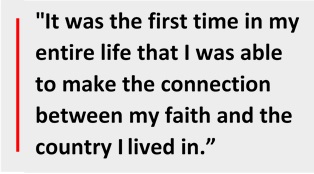 To understand the role of the Quran in her faith, Linta reflected on her American identity: “As citizens of America, we have the Constitution and the Declaration of Independence to remind us why we are here. When we become a citizen, we need to follow those rules to serve that community and help it grow and expand.”
To understand the role of the Quran in her faith, Linta reflected on her American identity: “As citizens of America, we have the Constitution and the Declaration of Independence to remind us why we are here. When we become a citizen, we need to follow those rules to serve that community and help it grow and expand.”
Linta realized that just like American citizens need to study those legal documents in order to understand their rights and learn how to best serve their country, she, as a member of the Ahmadiyya Muslim Community, has a responsibility to go back to the Quran and learn what it says.
“It was the first time in my entire life that I was able to make the connection between my faith and the country I lived in,” said Linta.
For the second half of her WISE project, Linta studied the Quran and its teachings so that she could educate members of her community and the world about their rights and opportunities according to the Quran.
“Women can’t be educated? Open up the Holy Quran, and tell me where women can’t be educated,” said Linta. “There is an entire chapter [Al-Nisah] dedicated to women.”
Linta continued, “They are my people, whether from Syria, Gaza, or Pakistan. It is [my] responsibility to remind not only the world, but our people of what we can do.”
Her WISE Family
Linta formed strong relationships with the WISE community at East Lyme.
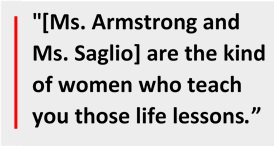 Her mentors, Priscilla Armstrong and Shannon Saglio, were “there for [her] the entire time.” When Linta was struggling with her faith, they would send her articles and video clips about her topic. Sometimes just reading a verse from the Quaran was enough to give Linta the “sudden boost of energy” she needed to continue exploring her faith.
Her mentors, Priscilla Armstrong and Shannon Saglio, were “there for [her] the entire time.” When Linta was struggling with her faith, they would send her articles and video clips about her topic. Sometimes just reading a verse from the Quaran was enough to give Linta the “sudden boost of energy” she needed to continue exploring her faith.
“[Ms. Armstrong and Ms. Saglio] are the kind of women who teach you those life lessons,” said Linta.
An “amazing teacher” and the WISE coordinator at East Lyme, Linda Foote also gave Linta “support, advice and suggestions ” throughout her WISE project.
Linta reached out to Matthew LaConti, a history teacher at East Lyme, for help with her research. Mr. LaConti guided Linta through the research process, teaching her how to find credible and diverse sources.
“I’m really passionate about this”
Linta will be attending the University of Connecticut in the fall to major in International Relations. Also on a premed track, she hopes to pursue a career in global public health.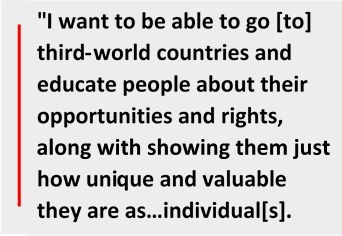
“I’m really passionate about this,” said Linta. “I want to be able to go [to] third-world countries and educate people about their opportunities and rights, along with showing them just how unique and valuable they are as…individual[s].”

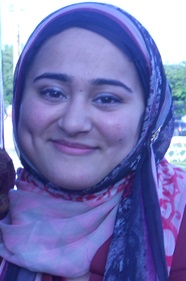
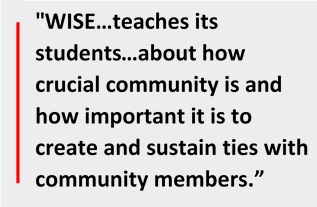
 Saving...
Saving...